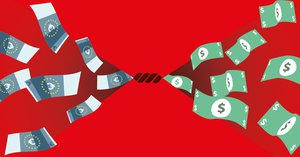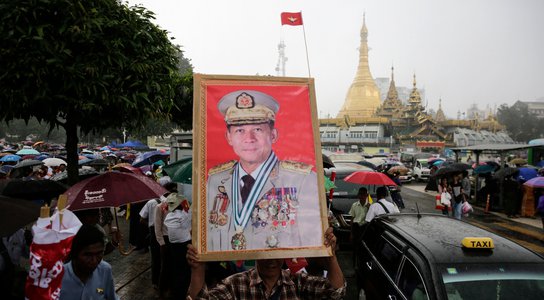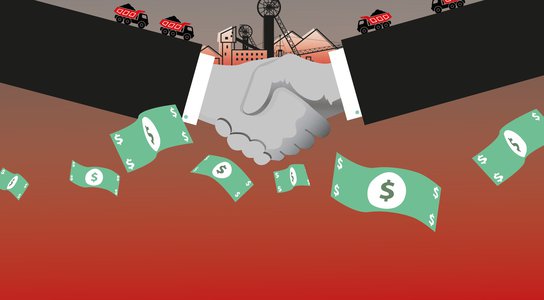The EU is often seen as a champion for human rights and as one of the most regulated financial markets in the world. However, as my investigation on mining magnate Dan Gertler Undermining Sanctions revealed a few weeks ago, if the EU does not create a robust corruption sanctions regime, it risks becoming a safe haven for those looking to evade US sanctions.
The problem with the proposed EU sanctions regime

In recent years, the European Union has considered creating a targeted global sanctions regime against foreign individuals involved in grave human rights abuses. Following in the footsteps of the US and Canada and a commitment from the UK, this tool would allow the EU to freeze assets and prohibit entry of individuals engaged in wrongdoing. However, unlike their North American and British counterparts, the EU’s proposed sanctions regime has a glaring omission - it fails to account for individuals involved in corruption.
This shortcoming opens the EU’s door to tainted money, undermines other international sanctions regimes and overlooks how corruption leads to the sustained deprivation of basic human rights.
The EU must therefore broaden the scope of its global sanctions regime and include corruption as grounds for being sanctioned. Our joint investigation with Platform to Protect Whistleblowers in Africa (PPLAAF) into the possible use of a money laundering network by mining magnate Dan Gertler to evade US sanctions shows whyHas mining magnate Dan Gertler turned to the EU to dodge US sanctions?
For the past year, together with colleagues at PPLAAF, I have been trawling through thousands of pages of bank accounts, company records and other leaked documents to examine whether controversial businessman Dan Gertler has been attempting to evade US sanctions.
Gertler was sanctioned in 2017 under the US Global Magnitsky sanctions regime, being implicated in “corrupt mining and oil deals” in the Democratic Republic of Congo (DRC). As a result of the sanctions, Gertler was prohibited from setting foot on American soil and American individuals, companies and banks were banned from doing business with him. The effect of this was to restrict Gertler's access to the US financial system. Evidence suggests that Gertler turned instead to the next best option: Europe and the euro.

Our investigation Undermining Sanctions has uncovered how Gertler appears to
have used a complex international network of shell companies, secret bank
accounts and proxies to evade US sanctions and launder his funds. Through a
Congolese bank with correspondent banks in the EU, Gertler’s affiliates appear
to have used a series of transfers to convert millions of euros into US
dollars, some of which appear to have been used to secretly buy a mining license
in DRC.
The Congolese bank in question also holds a euro account for a sanctioned company controlled by Gertler, which received regular payments from commodities giant Glencore. Between June and July 2018, Swiss-based Glencore paid Gertler over 18 million in euro-denominated payments, despite US sanctions. Under US sanctions, Glencore providing payments could qualify as providing material assistance or financial support to Gertler and risks being sanctioned in the future. Some of the money paid in euros into the Gertler-linked company’s Congolese account was routed back to Israel for payments for services and to religious organisations.
In many ways, this account lays bare the shortcomings of the international financial system, whereby an individual subject to US sanctions may be able to funnel funds through European banks and continue operating as before, potentially reaping the benefits of corrupt business deals.
Gertler, those associated with the network of shell companies, and the bank all denied sanctions evasion or involvement in anything other than legitimate business activity, stating that they had compelling evidence that suspicious bank payments relied on in our investigation had been fabricated. Gertler has repeatedly denied the allegations of corrupt deal-making which appear to have prompted the US sanctions.The human cost of corruption
The omission of corruption as a criteria in the EU sanctions regime leaves the continent’s door open to money that has been stolen from citizens.
Corruption essentially strips away state revenue from the people, crippling systems of accountability and undermining the very principles of democracy. For decades, Global Witness has been exposing the ways in which many authoritarian regimes - from Republic of Congo to Cambodia - and complicit corporations profit from the looting of natural resources, systemic corruption and nepotism. This process diverts funds from public services like health, shelter and education, and prevents people from meeting their most basic needs.

In DRC, for example, Gertler-linked deals in 2010 to 2012 have reportedly deprived the state of up to $1.4 billion in revenue. At the time, this was equivalent to twice the amount spent on health and education nationwide and accounted for almost 20% of the country’s annual budget.
DRC is one the world’s poorest countries - ranking 179th out of 189 on the United Nations Development Programme’s Human Development Index, which accounts for life expectancy at birth, average years of education and gross national income per capita. As the country faces Covid-19, the world’s largest measles epidemic and a new Ebola outbreak, investment in public services such as healthcare is more important than ever. The scope of the capture of state revenue by corrupt public officials in DRC, complicit foreign companies and businessmen is nothing short of plunder. Critically, this tainted money should not be allowed to enter the European financial system.
The EU sanctions regime must cover corrupt actors
Our investigation into Dan Gertler’s possible money-laundering network is emblematic of why it is so crucial that the EU includes suspected corruption as a criteria in its proposed global sanctions regime.
By their very nature, sanctions only work if they are multilateral. If US sanctions can be avoided by rerouting funds via European markets, they are undermined, the integrity of the EU’s financial system is compromised, and the rightful beneficiaries of those stolen funds are further deprived. Only one group stands to gain from inaction: sanctioned actors like Dan Gertler.


